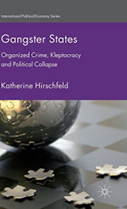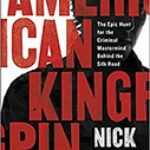Gangster States: Organized Crime, Kleptocracy and Political Collapse

Author: Katherine Hirschfeld
Publisher: Houndmills, Basingstoke, Hampshire; New York: Palgrave Macmillan, 2015. 176p.
Reviewer: Mark Galeotti | March 2016
This is in many ways a very difficult book to review. Hirschfeld, an anthropologist at the University of Oklahoma, sets out to understand organized crime and its activities through the lens of her discipline, and in particular to apply behavioral ecology, modeling the dynamics of predator-prey relations, to explain how systems of racketeering emerge and entrench themselves. As such, this is sometimes a fascinating and insightful read, and at other times a labored and awkward attempt to reinvent the wheel.
While she name checks a wealth of the leading scholars who have been considering organized crime, its economies and social structures, she seems at the same time to be willing to dismiss or overlook the actual essence of their work, and the vibrancy of the debates that have been taking place over the past two decades or more. She starts her preface saying that this book “developed out of a frustration with the inability of social scientists to explain the catastrophic outbreak of organized crime, violence and instability that erupted after the fall of the USSR” (p. x). The irony is that the text is strewn with the names of scholars who have precisely done that, often in rich detail and with conceptual innovation, such as Alena Ledeneva, Vladimir Shlapentokh, Federico Varese, and Vadim Volkov.
Apparently “few people in academia have studied or interacted with actual gangsters” (p. 3) and study has been hobbled “at least in part from the ideological polarization and binary language that dominated the field of political economy during the Cold War.” (p. 39) I confess I find it hard truly to reconcile such sweeping statements with all the powerful work done interviewing criminals and engaging in their worlds by scholars such as Dina Siegel, Jana Arsovska and Jennifer Blank, or exploring the deeper political economy of crime such as Stergios Skaperdas, Peter Andreas and Vincenzo Ruggiero.
Her fundamental thesis, which emerges about a hundred pages into the book, is that a Darwinian political economy tends to create an “evolutionary stable strategy” that tends towards forming and then protecting racket monopolies, around which form social scaffoldings. On one level, this looks simply like a restatement of Charles Tilly’s elegant equation of state-making with organized crime. However, Hirscheld’s disciplinary background and her research on Cuba allows her, by viewing the process in pseudo-biological terms, to tease out efficiently the essentially pragmatic, opportunistic and rational reasons behind the formation of monopolies and structures to protect them.
Her thesis is, to be honest, no great surprise. The structure is annoying at times, the text too often fragmented into too-short sections, and interspersed with so-called vignettes that are simply chunks of other texts that add little. Hirschfeld’s belief that the existing literature is still so hidebound and limited is also jarring.
For all that, though, there is also much to praise. It is an ambitious venture, and one I hope she develops, not least as anthropology in general has been under-exploited as a source of insights into gangsterism and racketeering. Her Darwinian notion that we can best understand the state as a “temporary cartographic inscription signifying that a racketeering group has grown powerful enough to claim defined geographic territory” (p. 128) is welcome in its provocative flair. In many ways this has been an ungenerous review, but anyone who in effect presents themselves as breaking new ground and showing the existing field how to address their subject needs to be absolutely sure of their foundations. Nonetheless, Hirshfeld brings anthropology further into organized crime studies, and in the process raises questions very well worth considering and presents a lens through which we should certainly peer.
Mark Galeotti is Professor of Global Affairs at New York University and director of its Initiative for the Study of Emerging Threats.


